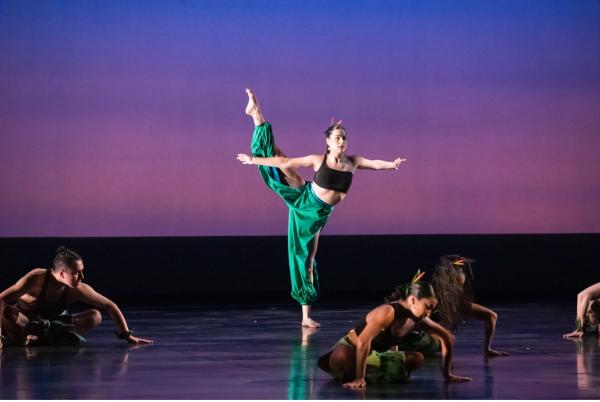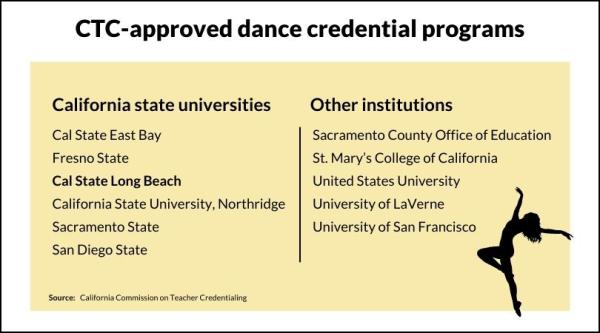Get on your feet! New credential to expand dance education
A new credential program at Cal State Long Beach promises to enrich dance education in local schools and expand career opportunities for dancers interested in teaching.
The CSULB College of Education has just begun offering a single subject credential in dance that teaches curriculum development, lesson design, teaching methods and classroom management for K-12 schools. It also includes clinical fieldwork supervised by veteran dance teachers.
The nine-course, 45-unit program is designed for students with a dance undergraduate degree or who can demonstrate subject-matter competency in dance. Until now, dance education has been a unit in the physical education credential program at CSULB.

When K-12 students are taught by credentialed dance teachers, they learn so much more than how to move beautifully, said Zakiya Atkinson, CSULB assistant professor of dance and the dance credential program’s coordinator. They learn how to create dances, perform dances and connect dance to the world around them. They also learn many forms of dance and the historical, social and cultural context behind them.
“It’s a very multidisciplinary experience that teaches a lot of transferable skills that students can take outside of the dance class and apply to their lives,” she said. “When students leave the program, they may become lifelong supporters of dance, they may become dance educators, they may become performers, they may become people who engage in dance socially and culturally.”

Cal State Long Beach is one of 11 universities and offices in California that have begun offering a dance credential since the state reinstated it in 2016. It comes as the demand for credentialed dance teachers is expected to grow exponentially.
That’s because in 2022, California voters overwhelmingly approved Proposition 28, which provides minimum annual funding to supplement existing arts education programs in PK-12 public and charter schools. Most of the money funds arts instructors, including dance teachers.
This year, the state is making more than $900 million available.
It’s hard to say just how many dance teaching jobs Proposition 28 will fund in coming years but there will be a lot, said Jessy Kronenberg, co-president of the nonprofit California Dance Education Association, which serves dancers through advocacy and professional development opportunities.
There’s a big push underway to credential more and more dance teachers so the demand is met, and districts don’t turn those positions into music or other kinds of arts jobs, she said.
“It’s a goal for every dance position that’s posted to be filled with a dance educator, like the folks who will be coming out of Long Beach,” said Kronenberg, who is also a dance teacher at El Cerrito High School in Contra Costa County. “It’s really an incredible moment right now for dance education and dance education programming.”

Chrissie Leong, a National Board-certified dance teacher at Garden Grove High School, said she’s excited to see CSULB helping California catch up to other states in credentialing dance teachers.
In the areas around CSULB, she said, elementary and middle schools are most in need of dance programs, and dance ought to be an option in every high school. K-12 dance education encourages creative freedom and seizes on the popularity of alternative forms of exercise, she said.
“We’re really embracing students’ individuality and differences in our classrooms, telling kids to be who they are,” said Leong, who earned her dance credential in New York. “And you know, some kids don’t want standard fitness routines such as the mile or team sports for their physical fitness.”
School dance instruction also exposes more children to more of the arts, Leong said, noting the high cost of lessons, costumes and performances.
"It’s really unfair how many families cannot afford it and therefore their children don’t get to dance,” she said. “When you put dance in public schools, it really evens out the playing field for so many.”
It did for Vernice Ednilao, who is entering Long Beach’s dance credential program after earning a Bachelor in Fine Arts in Dance with a minor in counseling and social justice from San Diego State in 2023.
Growing up in the Riverside County community of Murrieta, Ednilao loved dance from age 5. But she had to teach it to herself by watching YouTube videos because her parents, immigrants from the Philippines, couldn’t afford lessons.

When Ednilao entered the dance program at her public high school, it “opened up a whole new world” to her, she said.
Its academic requirements motivated her to do well in other subjects like calculus, English and social studies. Attending rehearsals and choreographing performances taught her accountability and leadership lessons. And she formed strong bonds with people during what can be fragile years for many young people.
“Dance is an art form that really connects people and having those friendships when I was an awkward teenager was very important to me, for my mental health,” Ednilao said.
Now she wants to teach dance in the public schools, first in the Long Beach area and perhaps later in her hometown. She did have to convince her parents that dance is an academic subject, that there’s so much more to it than physical movement.
“Trying to explain that to my parents was a bit difficult because we have cultural career expectations that we typically abide by,” Ednilao said. “It was difficult, but it was not impossible. I have a very supportive family, thankfully.”





